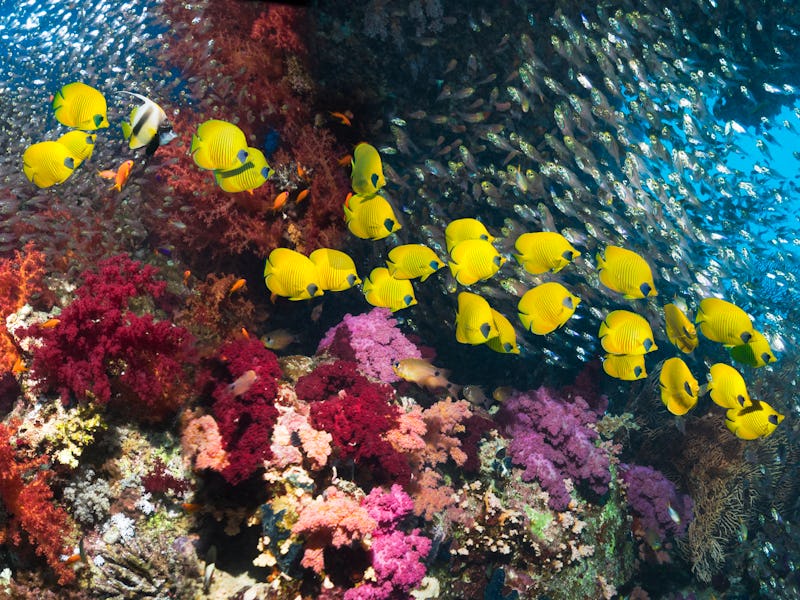Study reveals 3 ways scientists can save tropical marine life
Protecting corals means helping the rest of the ocean's animals.

The ocean’s corals face major threats, including coral bleaching and warming waters. These dangers cause ripple effects across the ocean. When corals die off, it critically affects other marine species — and humans too.
A new study sheds light on what people can do to help the fate of corals, and in turn, life beyond the reef.
Scientists collected data from 1,800 tropical coral reef sites around the world. The researchers determined three major ways to tell if coral is healthy — and exactly how to track how healthy they are:
- Measure the health of reef fisheries by tracking how many fish are present.
- Measure ecological function by analyzing whether parrotfish are grazing as usual.
- Measure biodiversity by looking at the overall number of species and individuals populating the reef.
All three of those metrics tend to improve when humans stay away from coral reefs, the study finds. It’s harder to see the corals thrive once humans start using a reef — even if we take steps to protect the area afterward.
This finding was published Thursday in the journal Science.
Management can improve only the first two goals of healthy coral reefs — strong fisheries and ecological function. It can't, however, bring back biodiversity, especially given the already fewer species and the pressures put on reefs by human activity.
Corals growing in the shallow waters of Kimbe Bay in Papau New Guinea.
This study helps fill the "critical gap" between the ways we manage coral reefs and actually meeting sustainability goals, the scientists say, providing guidance on what people charged with reef protection can realistically achieve.
Corals (and science) are adapting — While the outlook may seem bleak in an increasingly warming world, there's also some good news.
Studies have shown that corals are remarkably good at adapting to the changing climate. In 2018, researchers discovered that environmental pressures were actually pushing Great Barrier Reef corals to adapt — quickly. A team of scientists from the U.S. and Australia analyzed coral genetics at the population level, finding that genetic mutations are helping corals tolerate heat. That tolerance could spread throughout populations of coral within the next 100 to 250 years, according to the study, published in the journal PLOS Genetics.
And then there are the "super corals." Research published in 2019 — also conducted in the Great Barrier Reef — showed that particularly sturdy corals are able to outlive heatwaves and acidifying waters. These corals were "surprisingly good at surviving in increasingly hostile waters," the researchers explained.
The fact that corals are rapidly evolving to tolerate heat and acidity is promising, especially since it's happening at the scale of hundreds, not thousands, of years. But the Earth may be changing even faster than the corals can keep up.
Coral reefs provide a home for sea creatures like this bright green sea anemone.
For the third time in five years, the Great Barrier Reef is experiencing a mass bleaching event, as marine biologist Jodie Rummer wrote earlier this month. Rummer and her colleagues study how fish and other marine life in the reef are adapting to heat. During a recent project, the team measured temperatures they weren't expecting the ocean to reach until 2050 or 2100.
Like the new study on maintaining marine biodiversity, Rummer says the research underscores how humans have caused damage — and what they can still do to prevent the worst from happening.
"The future of the planet, the oceans, and the Great Barrier Reef lies in our collective actions to reduce global warming," Rummer writes. "What we do today will determine what the Great Barrier Reef looks like tomorrow."
Abstract: The worldwide decline of coral reefs necessitates targeting management solutions that can sustain reefs and the livelihoods of the people who depend on them. However, little is known about the context in which different reef management tools can help to achieve multiple social and ecological goals. Because of nonlinearities in the likelihood of achieving combined fisheries, ecological function, and biodiversity goals along a gradient of human pressure, relatively small changes in the context in which management is implemented could have substantial impacts on whether these goals are likely to be met. Critically, management can provide substantial conservation benefits to most reefs for fisheries and ecological function, but not biodiversity goals, given their degraded state and the levels of human pressure they face.